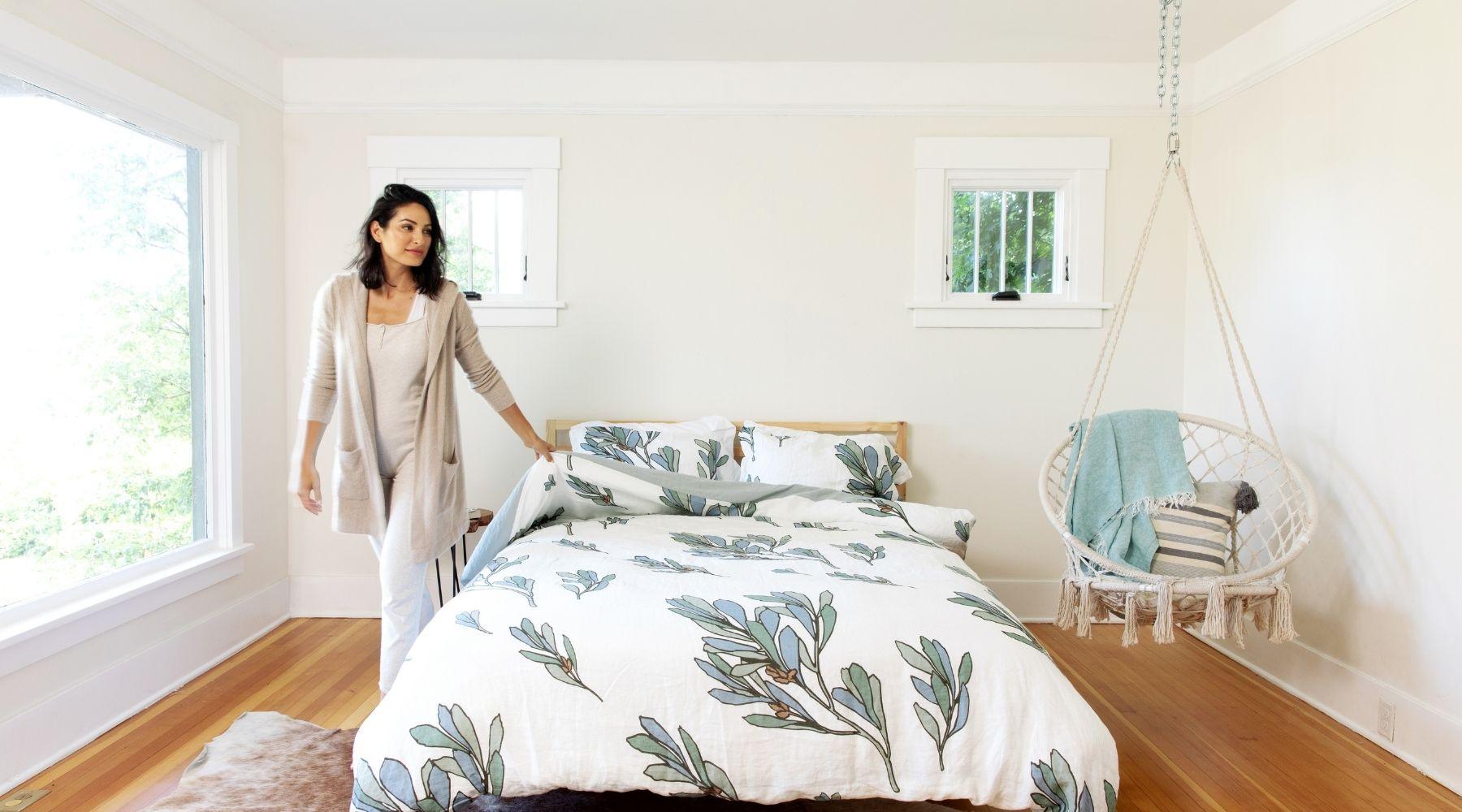
How To Find Quality Bedding and Why It Matters
Sifting through the plethora of bedding stores—online and otherwise—can be overwhelming. See what to look for and why the extra effort is worth it when it comes to finding super-soft, long-lasting bedding.
The Great Thread Count Myth
Many people—particularly online shoppers—refer to thread count when choosing bedding. Thread count refers to the number of threads in one square inch of fabric, with a higher number supposedly meaning better quality. But there’s an upper limit to how many threads can fit into one square inch of fabric—and that limit is 400.
How, then, can companies claim to sell “1,000 thread-count” duvet covers? It’s all down to ply, which refers to how many threads are spun together to make a yarn. Single-ply threads are stronger than double-ply threads—which means that 400 thread-count bedding may be of better quality than 800 thread-count bedding!
When it comes to extra-thick fibers like linen, thread count isn’t a consideration. It’s usually not even listed as there are better indicators of linen quality, such as certification—more on this below.
How To Find Soft, Long-Lasting Bedding
Durability is a hallmark of quality bedding. Bedding is a major investment—therefore, it should last for years.
Cotton appears to be soft and strong right out of the bag, and it’s true that premium cotton—such as Egyptian cotton—can last for years. However, all cotton wears and pills over time. After several washes, you’ll see worn patches and pilling starting to appear on your cotton bedding. Polycotton is more durable than cotton but tends to feel scratchy and sticky, as well as shedding harmful microplastics during washing.
Linen is a bast fiber, the same family of fibers as jute and hemp. Bast fibers are composed of tightly packed-together cells, which makes them extremely strong—hence why they’re used to make sacks, ropes and tarpaulins. However, linen is much softer than other bast fibers—and gets softer over time, as washing dissolves naturally-occurring pectin in the fiber. Our Nordic-style duvet covers are made from European linen—the finest linen in the world—and will last for years.
Thermoregulation: Your Route To A Better Night’s Sleep
The ability to regulate your body’s temperature—also known as thermoregulation—is a defining feature of quality bedding. Poor thermoregulation means that heat will either be trapped next to your body or escape too easily.
Polyester is a poor thermoregulator—it’s non-porous and will leave you drenched in sweat on hot nights. Cotton fares better, though its thermoregulating ability depends on its thickness. Too-thin cotton will let heat escape too easily, whereas thick, high thread-count cotton will trap heat around you.
Organic linen bedding, on the other hand, is well-known for its thermoregulating properties. It’s light enough to keep you cool during summer, yet it’s also great for winter. Just as a loosely woven sweater feels warmer than a tightly knitted one, linen’s porousness allows air to escape when it’s warm and forms an insulating layer when it’s cool.
Get Clued Up On Certification
How do you find bedding that’s safe, ethical, and sustainable? It’s not enough to examine the material alone, as the same crops are grown in different locations and under different conditions. Linen grown outside of Europe may have been treated with potentially harmful chemicals; the same applies to other fabrics usually seen as “sustainable,” such as silk and wool. In addition, many companies use greenwashing marketing techniques and buzzwords such as “natural” or “eco-friendly.” But without hard evidence, these claims are meaningless and you’ve no way of knowing whether the products you’re buying are truly safe for you or the environment. This is where certification comes in.
Look for OEKO-TEX Standard 100 Class 1 certification on your bedding—this is the gold standard in fabric safety. Fabrics with Class 1 certification are free from potential irritants and carcinogens such as formaldehyde, pesticides, and phthalates.
The Global Organic Textile Standard (GOTS) is the authority on sustainable and ethical production, with high standards for both. Products that carry GOTS certification have been produced using non-toxic, biodegradable compounds and bleached using only oxygen-based bleaches. In addition, all GOTS-certified products have been made in factories free from child labor, by workers who are paid a living wage and work reasonable hours in safe conditions.
Finally, look for the European Flax label when shopping for linen bedding. Certified European Flax is produced by farmers in France, Belgium, and the Netherlands who have signed up to the European Flax Charter—regulations that guarantee your linen bedding is free from GMOs and has been produced without artificial irrigation or waste. Our organic linen duvet covers are made from European Flax and are GOTS- and OEKO-TEX-certified, so you know that you’re buying high-quality bedding that’s both ethical and sustainable.
Maintenance Matters
While not directly related to bedding quality, your bedding’s maintenance will have a significant impact on your enjoyment of it. Bedding that requires ironing to look good will take up your precious time, leaving you feeling resentful and anything but relaxed. Additionally, washing at high temperatures drives up your energy bills and increases your carbon footprint.
White cotton is favored by corporate hotels for its crisp, businesslike look, but requires hours of ironing to keep it that way—you’ll also need to use bleach and wash it at a higher temperature to maintain its freshness.
Silk bedding has recently become popular for its luxurious look and feel but can look cheap when unironed. Remember, too, that animal-based textiles like wool and silk are incompatible with biological detergents, as the enzymes will dissolve proteins in the fibers.
Our organic linen duvet covers require less maintenance than other types of bedding, as linen can be washed cold and requires no ironing. In fact, linen fans often cite its rumpled, casual look as a major part of its appeal. Low-maintenance bedding means less strain on the environment—and more time for yourself.
Are you currently shopping for new bedding? Were you surprised to learn about the thread count myth? Let us know on Instagram, Pinterest, Facebook or Twitter!








Leave a comment
This site is protected by hCaptcha and the hCaptcha Privacy Policy and Terms of Service apply.